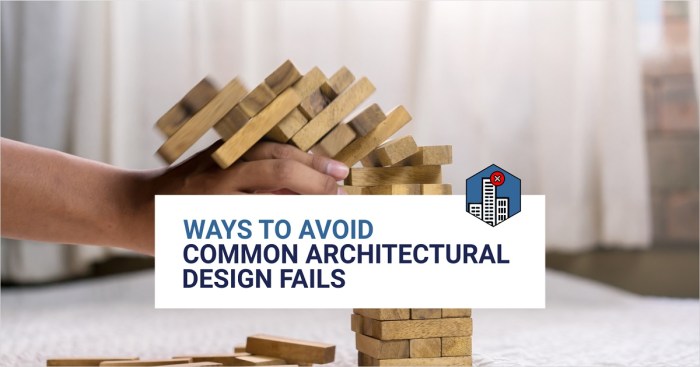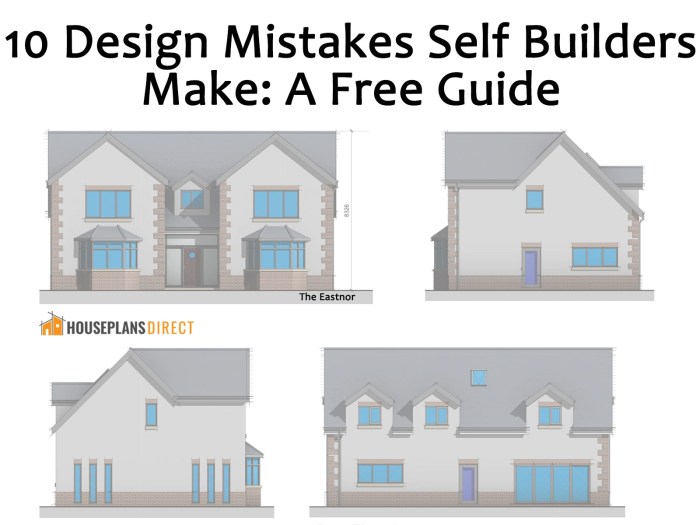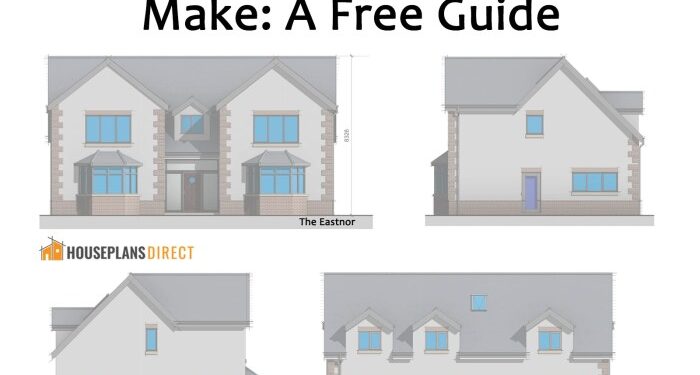Embark on a journey through the realm of architectural design mistakes that can significantly impact property value. From common errors to the importance of natural light and ventilation, this exploration promises to shed light on crucial aspects often overlooked in the architectural landscape.
Delve into the nuances of space planning, curb appeal, and structural integrity as we uncover how these elements can make or break the value of a property.
Common Architectural Design Mistakes

When it comes to architectural design, even small oversights can have a big impact on the overall value of a property. Let's explore some common architectural design mistakes that can significantly reduce the property value of residential and commercial buildings.
Lack of Natural Light
One common architectural design mistake is not incorporating enough natural light into a building. Dark and poorly lit spaces can make a property feel smaller, less inviting, and ultimately less valuable. By maximizing natural light through strategic window placement and design, a property can feel more open and appealing.
Poor Ventilation
Another mistake is overlooking proper ventilation in a building. Inadequate ventilation can lead to issues like mold growth, stuffiness, and poor air quality, which can impact the health and comfort of occupants. Ensuring good airflow and ventilation throughout a property is essential for maintaining its value.
Inefficient Layout
A poorly planned layout can also detract from the value of a property. Awkward room configurations, impractical flow between spaces, and wasted square footage can make a property less functional and attractive to potential buyers or tenants. Thoughtful design that maximizes usability and efficiency is key to enhancing property value.
Lack of Storage Space
Not providing enough storage space is a common design mistake that can reduce property value. Insufficient closets, cabinets, and storage solutions can make a property feel cluttered and disorganized, diminishing its appeal. Including ample storage options in a building improves its functionality and overall value.
Poor Space Planning
Efficient space planning is crucial in architectural design as it maximizes the functionality and usability of a property. Inadequate space planning can result in wasted square footage and ultimately decrease the property value.
Impact on Functionality
- Cramped living areas due to improper furniture placement.
- Inefficient traffic flow within the property.
- Lack of storage space resulting in cluttered rooms.
Impact on Appeal
- Awkward room layouts that make it difficult to furnish or decorate.
- Poor natural lighting and ventilation due to improper placement of windows and doors.
- Unbalanced proportions and scale of rooms leading to a lack of visual harmony.
Lack of Natural Light and Ventilation

Natural light and ventilation play a crucial role in architectural design, not only enhancing the aesthetics of a space but also impacting the overall well-being of its occupants.
Insufficient natural light can make a space feel dark, cramped, and unwelcoming. It can also lead to higher energy consumption as artificial lighting needs to be used more frequently. Poor ventilation, on the other hand, can result in stuffy and uncomfortable indoor environments, leading to issues like mold growth and poor air quality
Design Choices That Hinder Natural Light and Ventilation
- Small or few windows: Not incorporating enough or adequately sized windows can limit the amount of natural light entering a space and hinder proper ventilation.
- Obstructed views: Placing large furniture or structures in front of windows can block natural light and hinder airflow.
- Deep floor plans: Buildings with deep floor plans may struggle to receive natural light and ventilation in interior spaces, especially areas further from windows.
- Improper orientation: Failing to consider the orientation of a building in relation to the sun can result in certain areas receiving too much or too little sunlight, affecting natural light levels.
Neglecting Curb Appeal
When it comes to property value, curb appeal plays a crucial role in making a lasting impression on potential buyers or renters. Neglecting the exterior aesthetics of a building can significantly diminish its overall worth, as it is the first thing that people see and judge about a property.
Impact of Neglecting Curb Appeal
Ignoring curb appeal can lead to a decrease in property value due to a lack of visual appeal and attractiveness. Potential buyers may be deterred by a poorly maintained exterior, affecting their perception of the property's overall condition and value.
- Overgrown or unkempt landscaping: Neglecting to maintain the landscaping around a property can make it appear abandoned or uncared for, leading to a negative first impression.
- Lack of exterior lighting: Insufficient or poorly placed exterior lighting can make a property appear dark and unwelcoming, reducing its curb appeal and overall value.
- Outdated or poorly chosen exterior materials: Using outdated or mismatched materials on the exterior of a building can detract from its visual appeal and make it less attractive to potential buyers.
Inadequate Structural Integrity
Structural integrity is a crucial aspect of architectural design that ensures a building can withstand various loads and forces without experiencing failure. It involves the strength and stability of a structure, including its foundation, walls, columns, beams, and other components.
Compromising on structural integrity can have detrimental effects on the safety, longevity, and value of a property.
Importance of Structural Integrity
Structural integrity is essential for ensuring the safety of occupants and the durability of a building. Without proper structural stability, a property is at risk of collapsing or experiencing significant damage in case of natural disasters, such as earthquakes, hurricanes, or floods.
Additionally, buildings with inadequate structural integrity may require costly repairs or renovations to address structural issues, which can lower the overall value of the property.
Architectural Design Mistakes Impacting Structural Integrity
- Using substandard materials: Choosing low-quality materials for construction can weaken the structural integrity of a building and shorten its lifespan.
- Ignoring proper foundation design: Inadequate foundation design or construction can lead to settlement issues, cracks in walls, and overall structural instability.
- Improper structural calculations: Incorrect calculations or designs for load-bearing elements like beams and columns can result in structural failure under heavy loads.
- Overlooking seismic considerations: Failing to account for seismic forces in the design can make a building vulnerable to earthquakes and compromise its structural integrity.
Final Conclusion
In conclusion, understanding and avoiding these architectural design mistakes is key to maximizing the value of any property. By paying attention to the details discussed, property owners and architects alike can ensure that every aspect contributes positively to the overall worth of a building.
General Inquiries
How do architectural design mistakes impact property value?
Architectural design mistakes can significantly reduce property value by affecting functionality, aesthetics, and overall appeal.
What are some examples of common architectural design mistakes?
Examples include poor space planning, lack of natural light, neglecting curb appeal, and compromising structural integrity.
Why is natural light important in architectural design?
Natural light enhances the ambiance of a space, improves energy efficiency, and contributes to the overall well-being of occupants.
How can property owners rectify architectural design mistakes?
Property owners can rectify mistakes by consulting with professional architects, conducting renovations, and focusing on enhancing key design elements.



